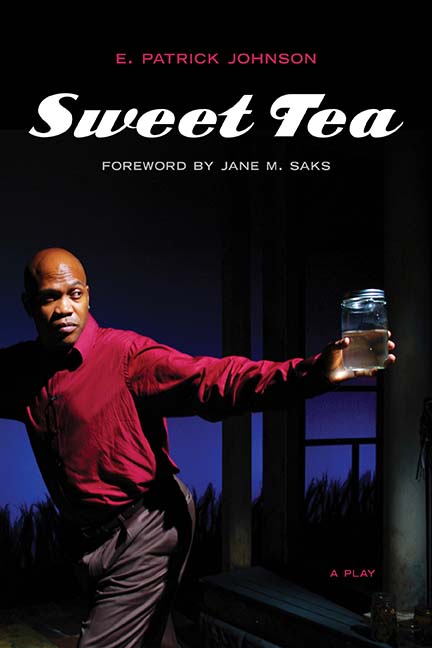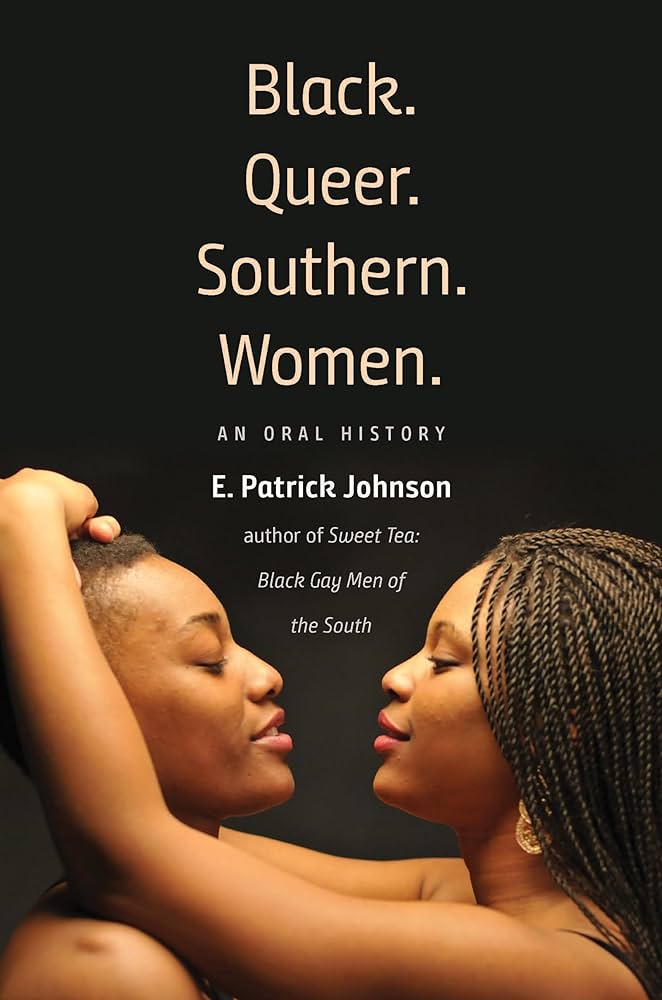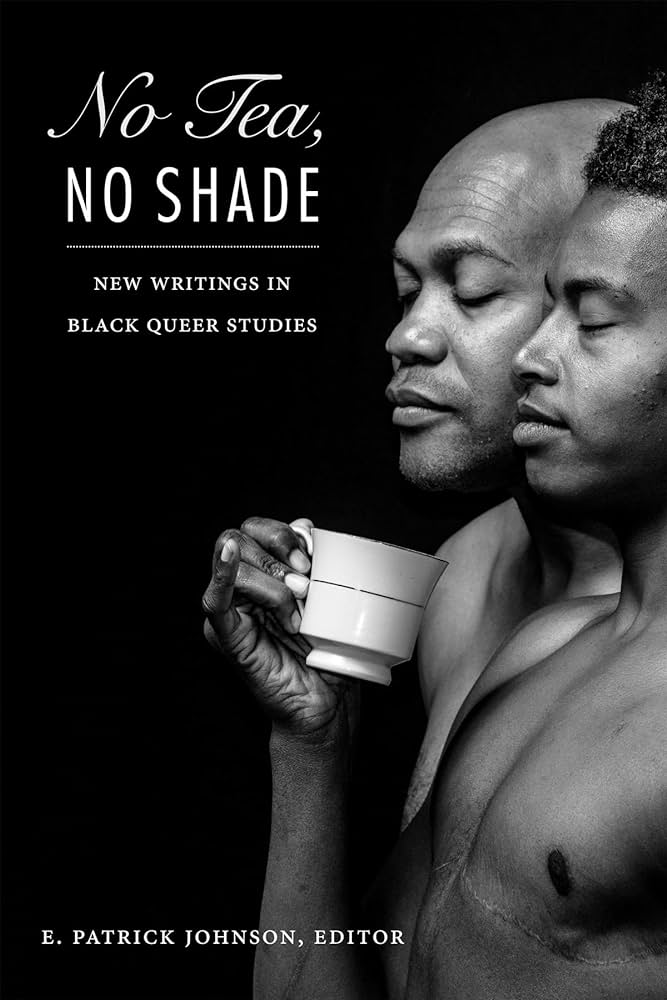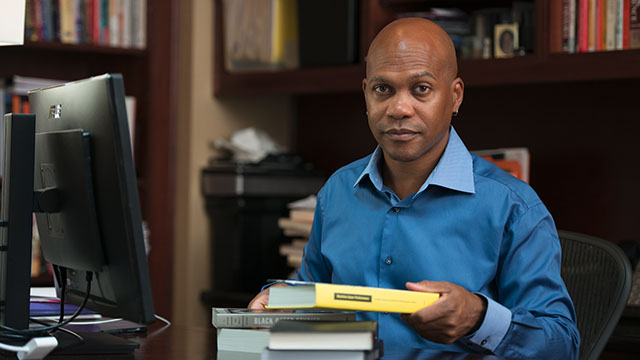Speaking for ourselves: An interview with E. Patrick Johnson
E. Patrick Johnson is having more than a moment. He is the 2023 David Kessler scholar for CLAGS, the Center for LGBTQ Studies—the first university-based research center in the U.S. dedicated to the study of issues of concern to the LGBTQ+ communities.
He’s also an ethnographer doing groundbreaking work in oral history. He’s also a performer, the first Black dean of Northwestern University’s School of Communication, and has a desire to teach a new generation how to be themselves while inspiring them to record the histories of those who paved the way.
The first thing to know about E. Patrick Johnson is that he’s charming. Soft-spoken and direct, he’s quick to smile and his manner is invitational, engaging and welcoming—he puts one at immediate ease. It’s not difficult to envision Johnson speaking with the men and women whose oral histories he has been cataloguing for the past two decades: Black queer people whose voices have been muted historically and purposefully. Nor is it hard to conjure him in a classroom, mesmerizing students with both his scholarship and his renowned acting chops.

Yet it is Johnson’s introduction of “quare” as a theoretical concept that propelled him to the Kessler lecture. “Quare”—and Johnson—have become increasingly influential in the fields of queer theory; women, gender, and sexuality studies; and Black studies. Johnson’s seminal work on “quare”—”‘Quare’ Studies, Or (Almost) Everything I Know About Queer Studies I Learned From My Grandmother”—was first published in Text & Performance Quarterly, but has been widely reprinted.
Johnson speaks about “the very absence of any race or class analysis” in queer studies scholarship and so the introduction of the term “quare” and its origins meant “quare” signaled a tectonic shift from the often cited and criticized lack of recognition of race and class by queer theorists as well as the same lapse with regard to gender and sexuality among Black Studies scholars.
In addition to his pathbreaking introduction of “quare” into the lexicon and canon, Johnson’s resume is so extensive and expansive, one would expect more of the distance most people associate with academics—that Ivory Tower elitism that has become a buzz phrase in the current anti-intellectual rhetoric coming from the right, in which CRT (Critical Race Theory) is invoked by people who have no idea what that is and claims of queer Marxist indoctrination on college campuses have given rise to alternative facts about what a college education should be and bolstered campuses like Hillsdale College and Liberty University.
That’s not Johnson, though. He doesn’t want distance between you and his work, you and his subjects, you and his captivating performances. Johnson wants you to know why he does the work he does and how it came about—the evolution from his small-town Southern roots where he is purportedly the first Black native of Hickory, North Carolina to receive a Ph.D., for which the town proclaimed a day in his honor. Johnson’s grandmother, Mary Adams, who pronounced queer “quare,” giving rise to a whole panoply of writings and scholarship by Johnson and the title of his lecture: “Quare; A Postscript,” was a defining influence. And Johnson’s deep connection to the people whose stories he illumines so vividly—all of this is how he became involved in recording oral histories and in performing his works on stage, and urging and inspiring another generation to record their own personal histories, as well as those of their antecedents.
Johnson delivered the 2023 Kessler Lecture at CLAGS: The Center for LGBTQ Studies at CUNY (City University of New York) in December. You can watch that below:
CLAGS provides a platform for intellectual leadership in addressing issues that affect sexual and gender minorities. As the first university-based LGBT research center in the United States, CLAGS nurtures cutting-edge scholarship, organizes colloquia for examining and affirming LGBT lives, and fosters network-building among academics, artists, activists, policy makers, and community members.
The prestigious David R. Kessler Lecture in Lesbian and Gay Studies was endowed by David R. Kessler to honor individuals who have made outstanding contributions to understanding lesbian and gay life.
Johnson opened his lecture with gratitude, thanking those who made it possible for him to both receive the award and help him arrive at that place. The final two of those thank yous—to his husband and to his grandmother—illumine the path his lecture takes and his work has forged and also give insight into Johnson the loving husband and adoring grandson. He said, “To my husband, my ride or die, Stephen Lewis, thank you for these past 25 years years of making it possible for me to do this work from driving folks to and from airports at conferences to creating the indexes for my books to always stepping in to support me, sometimes at the last minute so that I can shine. I love you.”

Johnson, who smiles when he speaks of Lewis, told Queer Forty that his husband has been crucial to his work and career. “My husband is a partner in every sense of the words. From the first year of our relationship Stephen has supported my artistic and research endeavors. Because of his background in television news producing and writing as well as his work in radio, he has been a part of producing my one-person shows and my recent documentary.”
He added, “In the former, he did voiceover work and created some of the visuals for the show and in the latter, he was one of the editors for the film. He has also assisted me with my traditional scholarship such as writing books in the fact that he helped me with the index for my first two books, despite him not having any experience with book indexing! I honestly could not do what I do without his love and collaboration on my artistic and scholarly work. I will always be grateful to him for using his talents toward helping support my career.”
Of his grandmother, Johnson said in the Kessler lecture, “And finally thank you to my grandmother Mary Lewis Adams, for making a way out of no way, so that I could be standing here today. This lecture is for her. Everything I know about queer studies I learned from my grandmother.”

It’s a striking statement and one he came back to time and again as Johnson spoke at length about his scholarship, but also about the importance of oral histories, an issue Queer Forty and this reporter have addressed often in recent years in interviews with LGBTQ elders like Joan Nestle, Linda Villarosa, Janis Ian, and Greg Herren. One point Johnson made repeatedly is that “historiography” is crucial and that “oral histories give nuance to historical events” that can’t be gleaned from “a newspaper clipping or a Playbill.” He said speaking to people who were there in the moment of an event has deep resonance for people who weren’t part of that time. Johnson said the first class he ever taught was “Oral Interpretation of Literature: and Johnson says, “I loved it.” He said he began to get students to relax and be comfortable and confident in themselves as they worked with him in the course.
“It’s okay–just breathe,” he told them.
The enticements of oral histories—of knowing from original sources what it was like to live in a particular time and live a particular history is what drove him to do the interviews in his well-known work, Sweet Tea: Black Gay Men of the South—An Oral History, which is also a performance piece and play and a documentary film.
Johnson said the title is both the sweetened ice tea everyone drinks in the South and a play on the Black gay term “tea”—a euphemism for gossip. He “went back to the South and started collecting stories.” In the dozens of interviews he conducted for the book, Johnson hoped to create an anchor for people like he was growing up in the South, to know they were not alone. Johnson was bullied and name called when he was growing up, his soft-spoken manner targeting him as a “sissy” and the f word.
As he said in a different interview in 2019, Johnson “hoped the book would help alleviate” the feelings of being the only one, “for someone to pull me to the side and say, ‘No baby, you ain’t the only gay person.’” Sweet Tea has had deep resonance over the years, with people relating to both the men he interviewed and the stories they told.
The import of these histories cannot be overstated. Literally no one had ever done this work before Johnson, which is stunning to contemplate: all these Black queer/quare voices suppressed for generations. The impact of that work has bolstered Johnson’s impressive resume. It and the catalogue of his work are daunting. Dean of the School of Communication and Annenberg University Professor at Northwestern University and a 2020 inductee into the American Academy of Arts and Sciences, Johnson has additional appointments in the Gender and Sexuality Studies and American Studies programs at Northwestern. A scholar/artist, Johnson performs nationally and internationally and has published widely in the areas of race, gender, sexuality and performance.
Yet unlike so many academics, Johnson isn’t proprietary about his scholarship. You can watch his masterclass on “Black Queer Studies: A Genealogy,” as well as his lecture on “From Field to Performance: Oral History & Ethnographic Field Research on Stage” on YouTube.
Known as an inspiring teacher, Johnson is also a prolific performer and scholar whose research and artistry has been a huge influence in the academy. In addition to Sweet Tea, he is the author of Appropriating Blackness: Performance and the Politics of Authenticity (2003); Black. Queer. Southern. Women. An Oral History (2018) and Honeypot: Black Southern Women Who Love Women (2019).



Johnson has also edited and co-edited some groundbreaking collections, Black Queer Studies: A Critical Anthology (edited by E. Patrick Johnson & Mae G. Henderson, 2005); Cultural Struggles: Performance, Ethnography, Praxis (edited by E. Patrick Johnson, 2013); solo/black/woman: scripts, interviews, and essays (edited with Ramón H. Rivera-Servera, 2013); No Tea, No Shade: New Writings in Black Queer Studies (edited by E. Patrick Johnson, 2016) and Blacktino Queer Performance (edited with Ramón H. Rivera-Servera, 2016).
But when asked how he arrived at this path of scholarship from Hickory, North Carolina, Johnson laughs and invokes his grandmother and his mother. Johnson says his mother “always knew” he would be a professor, “she said that because I always asked questions. So I was an inquisitive child but you know I didn’t know that this would be the path that I eventually got on because—people don’t believe this, but I was a really shy child.”
Johnson said he had stage fright and his mother would put him in talent shows. He said it was his role in choirs growing up that “brought me out of my shell” and “became the the kind of stage, if you will, for me to come out of my shyness.”
Come out of that shyness he did. And exceed his mother’s vision of his professorial future he did as well. Johnson has received a series of prestigious awards for his scholarship, including the Lilla A. Heston Award, the Errol Hill Book Award, Hurston/Wright Legacy Book Finalist, Stonewall Book Award Honor Book, Lambda Literary LGBTQ Studies Book Award Finalist, the Randy Majors Memorial Award for Outstanding Contributions to LGBT Scholarship in Communication, Publishing Triangle Judy Grahn Award for Lesbian Nonfiction Finalist, Lambda Literary LGBTQ Anthology Award Finalist. In 2010 he was inducted into the Chicago LGBT Hall of Fame.
And in keeping with finally divesting of his purported shyness, Johnson’s performance work dovetails with his written work. His staged reading, Pouring Tea: Black Gay Men of the South Tell Their Tales is based on his book, Sweet Tea, and has toured to over 100 college campuses from 2006 to the present, and his full-length Sweet Tea—The Play, premiered in Chicago and toured to Austin, Texas, Washington, DC, New York, Los Angeles, Providence, Rhode Island, Durham, North Carolina and the National Black Theater Festival.
Johnson has also received awards for his performance work, he is also the star and co-executive producer (with John L. Jackson, Jr.) of the documentary, Making Sweet Tea, based on the book and play.
Making Sweet Tea follows Johnson as narrator. He engages each of the men in the film, from Harold, who had been with his partner, a white man also named Harold, for nearly 50 years before he passed away in 2017 to Duncan, a Unitarian minister in Atlanta who has spent much of his life as an AIDS/HIV activist. It closes with Charles, a hairdresser from Hickory, where Johnson grew up. Charles previously performed as a drag queen named Chastity.
Johnson said, “The film is about my own journey back to the South as an openly gay man and my relationship to my community. It’s about what’s happened to these men, since I originally interviewed them over a decade ago. It’s about the making of the play, and it’s also about me performing the men’s stories in front of them.”
In the film, Johnson asks each person to make his individual version of sweet tea, then they taste the classic drink together. “These men have given me a different perspective on my own life,” Johnson says at the end of the film, “about how to live, about how to love, about how to just be in the world, loving yourself, especially for who you are.”
Nora Gross, the film’s director, told Penn Today that Charles cried when he watched Johnson’s performance as him. Gross said, “Patrick performed the monologue—Charles’ own words from their original interview a decade earlier—in the same cabaret space where Charles used to perform in drag himself. I don’t think we anticipated that Charles was going to have such a strong reaction.”
She said, “But during that 10-year period, so much happened in his life and he’d gone through so many transformations, including finally feeling comfortable in his own skin. That moment is a reminder of how versatile we each are, how much we evolve, and that each of us is not just one thing. That’s a moment when people are often moved to tears, and I always am, every time I watch it.”
This is what Johnson said he wants people to know about oral histories: they capture people, they capture emotion and experience and all the vicissitudes and joys of a life. He said we can’t risk losing those voices and those stories–especially those of historically marginalized people whose voices have been suppressed.
And that could become increasingly crucial as the country turns right and the MAGA GOP takes hold in both the election-inspired culture wars and the spillover into college campuses with restrictions on free speech a constant question.
Last year, Johnson shared a panel on the threats to Black studies and the fight over Black history for Democracy Now! with Guggenheim fellow and professor of African American Studies at Northwestern University, Keeanga-Yamahtta Taylor and Khalil Gibran Muhammad, Ford Foundation Professor of History, Race, and Public Policy at Harvard Kennedy School and the Radcliffe Institute. It was just weeks after Florida’s Republican Governor Ron DeSantis threatened to ban the AP Black studies course in Florida schools, and Florida’s Education Department said the course, quote, “lacks educational value.”
Of threats to his voice and work, Johnson said, “As the target of censorship by government officials in various states around the country, I have become even more committed to teaching queer and Black history. The more these forces try to silence us the more vocal we must become.”






